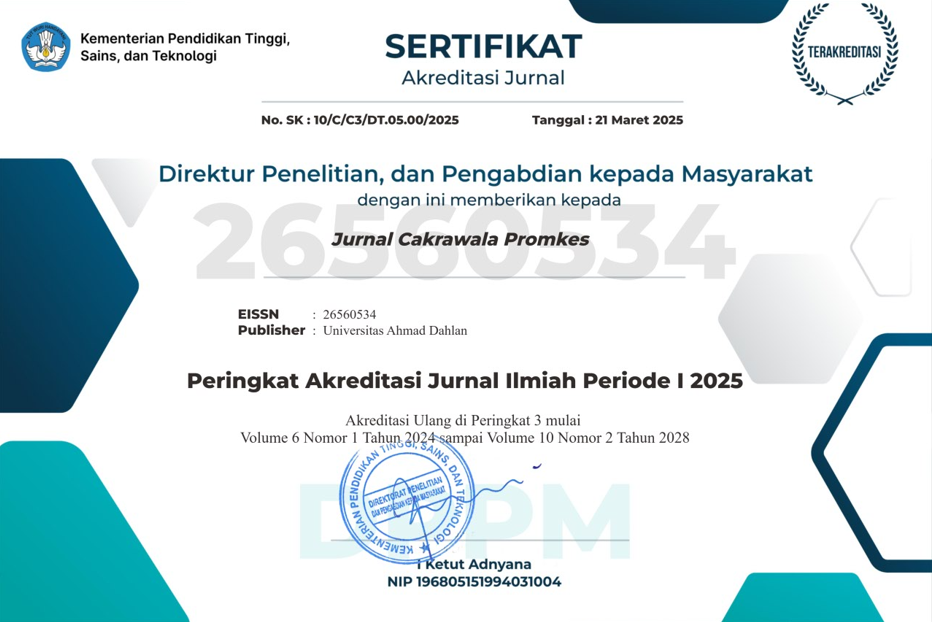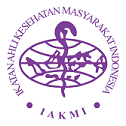Struktur birokrasi dan disposisi dalam pelaksanaan kawasan sehat bebas asap rokok di sekolah
DOI:
https://doi.org/10.12928/promkes.v2i1.1773Keywords:
Healthy area, Cigarette, School, Bureaucratic structure, Disposition.Abstract
The Special Province of Yogyakarta tended to be high at 21.2% for the proportion of the population aged over or equal to 10 years who smoked every day. One of the districts in the Yogyakarta Special Region that has a policy on non-smoking areas is Bantul Regency. The regulation regarding the non-smoking areas is regulated in the Bantul Regent's Regulation No. 18 of 2016 concerning Healthy Areas Non-Smoking (HANS). This study aims to determine the structure of the bureaucracy and disposition in the implementation of a Healthy Smoke-Free Area in Schools. This research uses the descriptive qualitative method. Data analysis using data reduction, data presentation, and drawing conclusions. The results of interviews about the bureaucratic structure in the implementation of the HANS found that there were no smoking procedures for smokers in schools. General rules are included in the school code of conduct in the form of a slogan/smoking ban. The disposition aspect possessed by the school could not be said to be good in the implementation of the HANS, it was evident that there were still school residents who still smoked in the school area and found cigarettes put in the school area. The conclusion of the research is that the bureaucratic structure does not yet exist and the disposition factor cannot be carried out properly so that it is expected that there will be a follow-up from the Government of Bantul Regency to be able to socialize Bantul Regent Regulation No. 18 of 2016 concerning Smoke-Free Healthy Areas in the school environment involving the role of the Health Office, BNNP and/or the Police and develop a culture of reporting and providing guarantees for reporters, as well as making special regulations for school residents who have a smoking habit.
References
2. Bustan MN. Epidemiologi Penyakit Tidak Menular. Jakarta: Rineka Cipta; 2007.
3. Tobacco Atlas. [cited 2020 14 Februari]; Available from www.tobaccoatlas.org.
4. Prabandari, Y. S. (2009). Kawasan tanpa rokok sebagai alternatif pengendalian tembakau studi efektivitas penerapan kebijakan kampus bebas rokok terhadap perilaku dan status merokok mahasiswa di fakultas kedokteran UGM, Yogyakarta. Jurnal Manajemen Pelayanan Kesehatan, 12(04)
5. Mackay, J., Jemal, A., Lee, N. C., & Parkin, M. (2006). The Cancer Atlas. 2006 American Cancer Society 1599 Clifton Road NE, Atlanta, Georgia 30329, USA. Can also be accessed at www. cancer.org.
6. Departemen Kesehatan Indonesia. Profil Kesehatan Indonesia 1999. Pusat Data Kesehatan, Depkes RI, Jakarta, 1999.
7. Mackay, J., Eriksen, M., & Eriksen, M. P. (2002). The tobacco atlas. World Health Organization.
8. World Health Organization, & Research for International Tobacco Control. (2008). WHO report on the global tobacco epidemic, 2008: the MPOWER package.
9. Peraturan Bupati Bantul Nomor 18 tahun 2016 tentang Kawasan Sehat Bebas Asap Rokok
10. Peraturan Menteri Pendidikan dan Kebudayaan Nomor 64 tahun 2015 Tentang Kawasan Tanpa Rokok Di Lingkungan Sekolah.
11. Riskesdas. Laporan Nasional Riset Kesehatan Dasar. Jakarta: Kementerian Kesehatan RI 2010.
12. Puswitasari, A., Santosa, S., & Wijayahadi, N. (2012). Faktor Kepatuhan Mahasiswa dan Karyawan Terhadap Peraturan Kawasan Tanpa Rokok di Lingkungan Kampus Fakultas Kedokteran Universitas Diponegoro.
13. Parks, T., Wilson, C. V., Turner, K., & Chin, J. W. (2009). Failure of hospital employees to comply with smoke-free policy is associated with nicotine dependence and motives for smoking: a descriptive cross-sectional study at a teaching hospital in the United Kingdom. BMC Public Health, 9(1), 238.
14. Notoadmodjo S. Promosi Kesehatan dan Ilmu Perilaku. Jakarta: Rineka Cipta; 2007.
15. Winarno, B. (2012). Kebijakan publik: teori, proses, dan studi kasus: edisi dan revisi terbaru.
16. Widodo, Joko. 2017. Analisis Kebijakan Publik, Konsep dan Konsep dan Aplikasi Analisis Proses Kebijakan publik. Malang : Media Nusa Creative
17. Suharno. 2013. Dasar-Dasar Kebijakan Publik; Kajian Proses dan Analisis Kebijakan.Yogyakarta: Ombak
18. Nurfita, D., Rokhmayanti, R., Agustin, H., & Sugathan, S. (2019). The Evaluation Of A Smoke-Free Area Declaration Program To Create A Healthy City At Puskesmas Gondokusuman. Epidemiology and Society Health Review (ESHR), 1(1), 41-50.
Downloads
Published
Issue
Section
License
Copyright (c) 2020 Parmadi Sigit Purnomo, Totok Sundoro, Pramukti Dian S

This work is licensed under a Creative Commons Attribution-ShareAlike 4.0 International License.
Authors who publish with JCP: Jurnal Cakrawala Promkes agree to the following terms:
- Authors retain copyright and grant the journal the right of first publication with the work simultaneously licensed under a Creative Commons Attribution License (CC BY-SA 4.0) that allows others to share the work with an acknowledgement of the work's authorship and initial publication in this journal.
- Authors are able to enter into separate, additional contractual arrangements for the non-exclusive distribution of the journal's published version of the work (e.g., post it to an institutional repository or publish it in a book), with an acknowledgement of its initial publication in this journal.
- Authors are permitted and encouraged to post their work online (e.g., in institutional repositories or on their website) prior to and during the submission process, as it can lead to productive exchanges, as well as earlier and greater citation of published work.

This work is licensed under a Creative Commons Attribution-ShareAlike 4.0 International License












